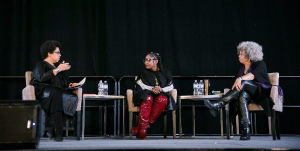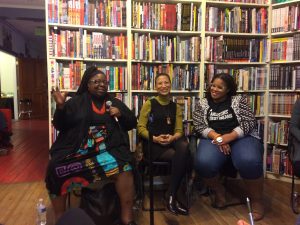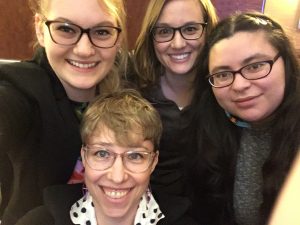by Jamie O’Quinn

On November 16, 2017, the National Women’s Studies Association (NWSA) began its annual meeting in Baltimore, Maryland. I was thrilled to have my first NWSA conference oriented around the 40th anniversary of the prolific Combahee River Collective (CRC) Statement, a call for radical Black queer feminist practice.
This year’s NWSA meeting was unapologetically activist-oriented, with plenaries connecting the CRC’s aims to the current Movement for Black Lives. Scholars noted the continued relevance of the CRC Statement in its ability to address the overt racism of the Trump presidency and color-blind racism of #AllLivesMatter. The spirit of intersectional resistance that permeated the conference can best be described in one passage from the document:
“If Black women were free, it would mean that everyone else would have to be free since our freedom would necessitate the destruction of all the systems of oppression.” (CRC Statement, 1977)
#Blacklivesmatter co-founder Alicia Garza and abolitionist, feminist activist and scholar Angela Davis kick-started the conference in the Keynote Address, discussing the urgency of Black radical feminism in the Trump era. In a plenary session, original members of the CRC, including Barbara Smith, Margo Okazawa-Rey, and Demita Frazier, spoke alongside intersectionality theorist Kimberlé Crenshaw about the importance of reclaiming intersectionality and embodying a Black feminist politic. In still more sessions, scholars whose work I have been reading since I was an undergraduate student discussed theorizing radical, “unruly” feminist ethnography and reimagining possibilities for reproductive justice.
I was overwhelmed in the best possible way.


Throughout the weekend, I couldn’t help but note my gratitude at feeling a sense of political urgency at an academic conference. Too often, activism is pushed to the margins of the social sciences, delegated to a fringe panel on public sociology and absent from plenaries and major events. This raises questions about the role of activism in the academy and the politics of representation.
Professors (and even graduate Teaching Assistants) have recently come under attack for their progressive politics. As educators, what does it mean to embody our radical, queer, anti-capitalist, anti-racist, feminist consciousness in the classroom? Can we imagine a world in which activist-oriented scholars of color, women, and LGBTQ+ folks are not marginalized in the academy for their politics, or, as often happens, accused of conducting “me-search” for their “activist agenda”?
Here’s to hoping ASA’s 2018 meeting, “Feeling Race: An Invitation to Explore Racialized Emotions,” will centralize the importance of theory translating to feminist praxis. See you all in Philadelphia!

___________________________________________________________________________
Jamie O’Quinn is a second-year doctoral student in the Department of Sociology. Her research interests center around sexuality, gender, race and ethnicity, and social inequality. She is currently researching state efforts to regulate young people’s sexualities.
